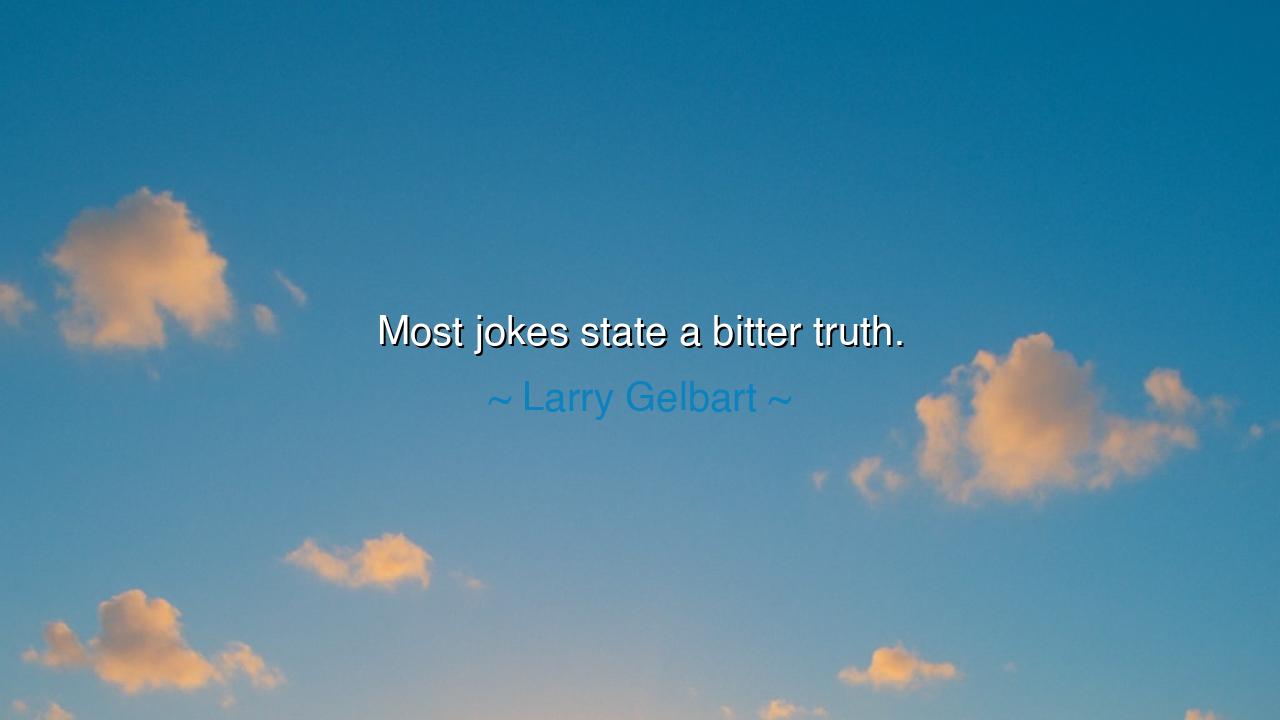
Most jokes state a bitter truth.






The words of Larry Gelbart—“Most jokes state a bitter truth.”—ring with the paradoxical wisdom of laughter. In them lies the revelation that humor is not merely play or amusement, but a mirror polished with irony. A joke may clothe itself in jest, but beneath its surface it often carries a dagger, sharp and cutting. It is the safe vessel through which people utter what they dare not say openly, the cloak under which harsh realities slip past defenses. Thus, when the heart laughs, the mind is often being pierced by truth—not gentle, but bitter, for it exposes weakness, folly, or injustice.
The origin of this insight lies in the craft Gelbart himself knew well as a writer of satire, most famously for MASH*. In the horrors of war, where blood and sorrow might overwhelm the spirit, his characters used humor to reveal truths too raw to face directly. A soldier might joke about the absurdity of bureaucracy, or the cruelty of battle, and in that laughter the audience recognized what could not be said plainly: that war is madness. Gelbart understood what the ancients also knew—that laughter is a form of survival, and that jokes often smuggle truths past the guards of fear and denial.
The ancients themselves practiced this art. Aristophanes, the playwright of Athens, filled his comedies with ridicule of politicians, philosophers, and generals. The people laughed at the antics of his characters, but beneath the laughter lay recognition: their leaders were corrupt, their wars senseless, their city flawed. Through jokes, Aristophanes spoke bitter truths that could not be declared in solemn speech without punishment. His words endure because his humor carried truth like a hidden flame.
History gives us countless examples of laughter piercing through the darkness. In the Soviet Union, citizens told whispered jokes about the inefficiency of the state, about empty shelves and pompous leaders. These jokes were dangerous, but they were also a release—a way to speak bitter truths when open speech was forbidden. Even in the midst of oppression, humor revealed the cracks in the walls of tyranny. The tyrant may silence protest, but he cannot silence the laughter that betrays reality.
Yet this principle is not confined to politics and war. In daily life, too, we often use humor to soften the harshness of truth. A friend may joke about his forgetfulness, but beneath the laughter lies the admission of weakness. A family may laugh at their struggles, yet through the joke they acknowledge the weight of their burdens. Laughter makes the unbearable bearable, but it also forces us to face what we would rather deny. The bitter truth slips into the heart on the wings of a jest.
The lesson here is twofold. First, we must learn to listen deeply to laughter, for within it may lie the truth people cannot say aloud. A joke is often a confession disguised. Second, we must also be brave enough to acknowledge the truth behind our own humor. When we laugh at ourselves, we often reveal what we most fear, what we most struggle with. To laugh honestly is to invite others to see us not in illusion, but in reality.
Therefore, take this to heart: do not dismiss humor as frivolous. Listen for the bitter truths it conceals, whether in art, in politics, or in the voice of a friend. When you speak in jest, examine what you are truly revealing, and let laughter become not only a shield, but a bridge toward honesty. For as Larry Gelbart reminds us, most jokes state a bitter truth—and those who learn to hear the truth in laughter will find themselves wiser, braver, and closer to reality.






G5luffy gear 5
I find this quote by Gelbart intriguing, but it makes me question: do jokes really always convey a bitter truth? Could it be that some jokes simply exist for amusement, without any deeper meaning? Or perhaps the 'bitter truth' is subjective—what one person finds painfully true, another might not even notice. Does the intention behind the joke shape the truth it reveals, or is it about how the audience interprets it?
BNNguyen Thi Bich Ngoc
Gelbart’s quote strikes me as both witty and profound. It makes me reflect on the role of humor in society. If most jokes state a bitter truth, what does that say about the state of the world? Are we laughing to avoid facing reality, or is it because we’re all in on the shared truth of a situation? It’s almost as if humor becomes a coping mechanism to face the things that are too difficult to address directly.
MLMy Le
This quote feels very insightful. Humor often serves as a way to point out uncomfortable truths that we might otherwise avoid. But why do we need humor to expose these truths? Is it that we’re not ready to accept certain facts without a lighter approach, or does humor serve as a form of rebellion against societal norms? I think there’s a deeper layer to jokes that speaks to both the human experience and the way we deal with pain.
BTNguyen Hoang Bao Tran
Larry Gelbart's quote about jokes revealing a bitter truth really made me think. Why do we tend to use humor to express difficult or uncomfortable truths? Is it because laughter helps us cope with reality, or does it make those truths more digestible? I wonder if the humor is a way of disarming us before confronting harsh realities, or if it's a tool for making serious points without sounding too harsh.